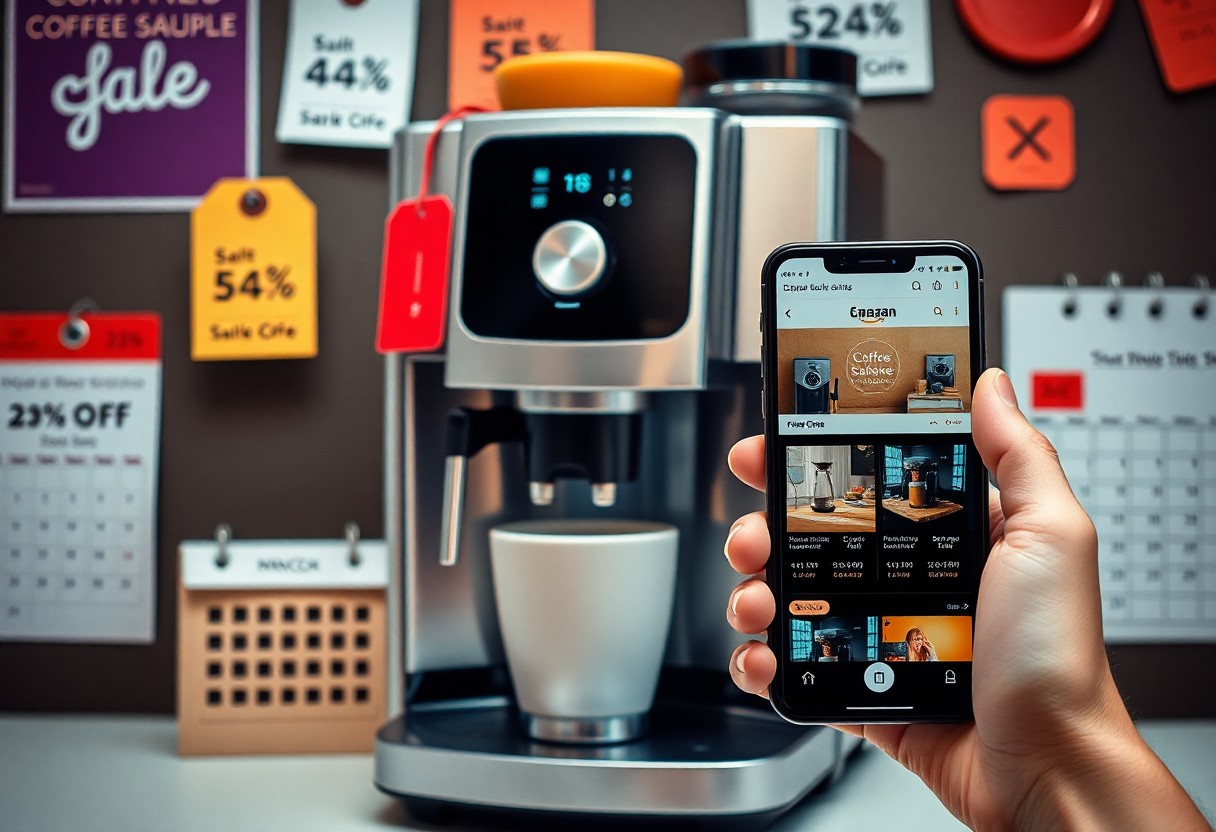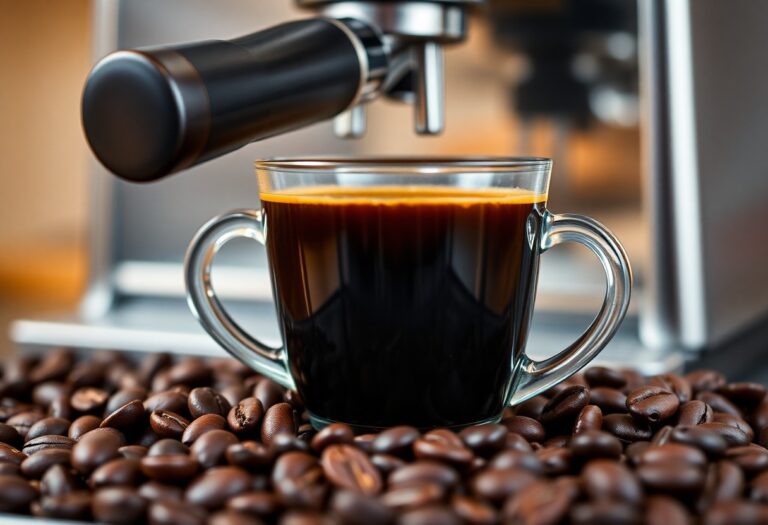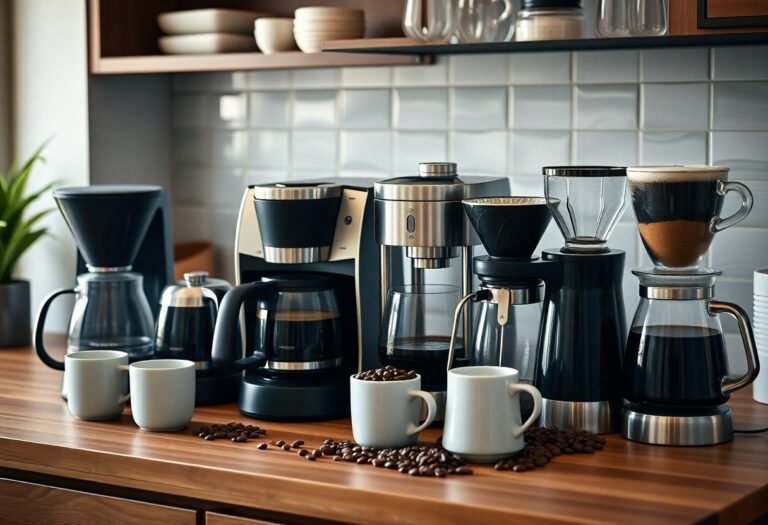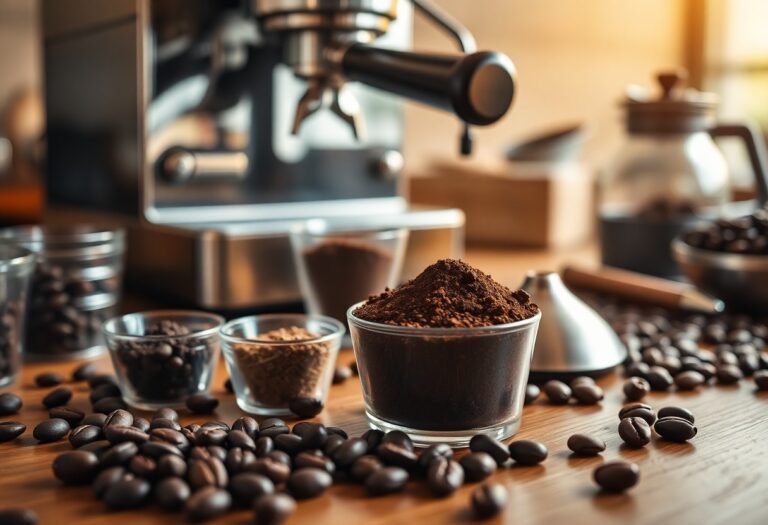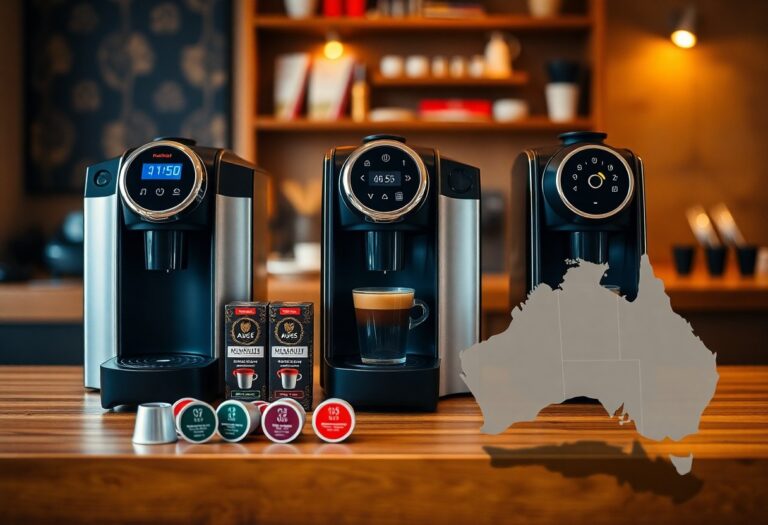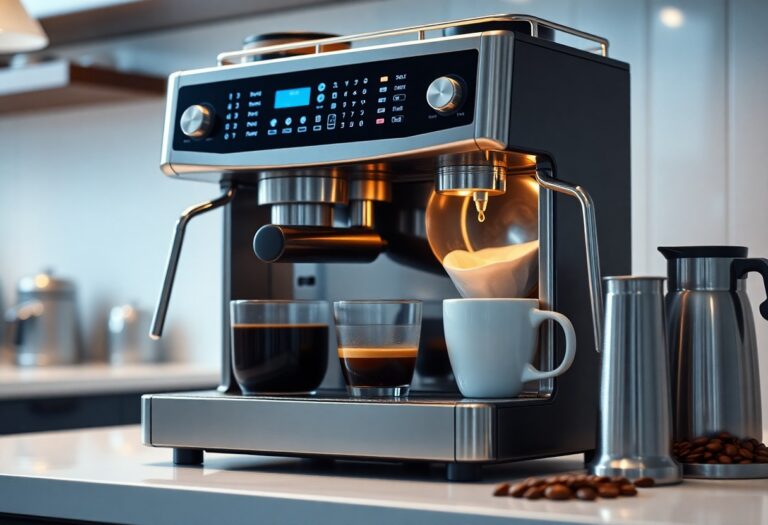What is the Price of a Coffee Machine – Cost Overview
Most coffee lovers face the question of how much to invest in a coffee machine for their home or office. The price range can vary significantly based on features and brand, with options starting from as low as $20 for basic models to over $2,000 for high-end espresso machines. Understanding the cost factors, such as build quality, functionality, and brand reputation, will empower you to make an informed decision that suits your budgetary needs and lifestyle. In this guide, you’ll discover the price spectrum and what to expect from each category.
Key Takeaways:
- The price of a coffee machine varies widely, typically ranging from $20 for basic models to over $500 for high-end machines.
- Factors influencing cost include the type of coffee machine (drip, espresso, single-serve), brand reputation, and additional features such as built-in grinders or programmable settings.
- Budget-friendly options are available for casual users, while serious coffee enthusiasts may invest in premium machines that offer more advanced brewing capabilities.
- Maintenance costs, such as water filters and cleaning supplies, should also be considered when assessing the overall investment in a coffee machine.
- Shopping during sales events or looking for refurbished models can provide significant savings on coffee machines.
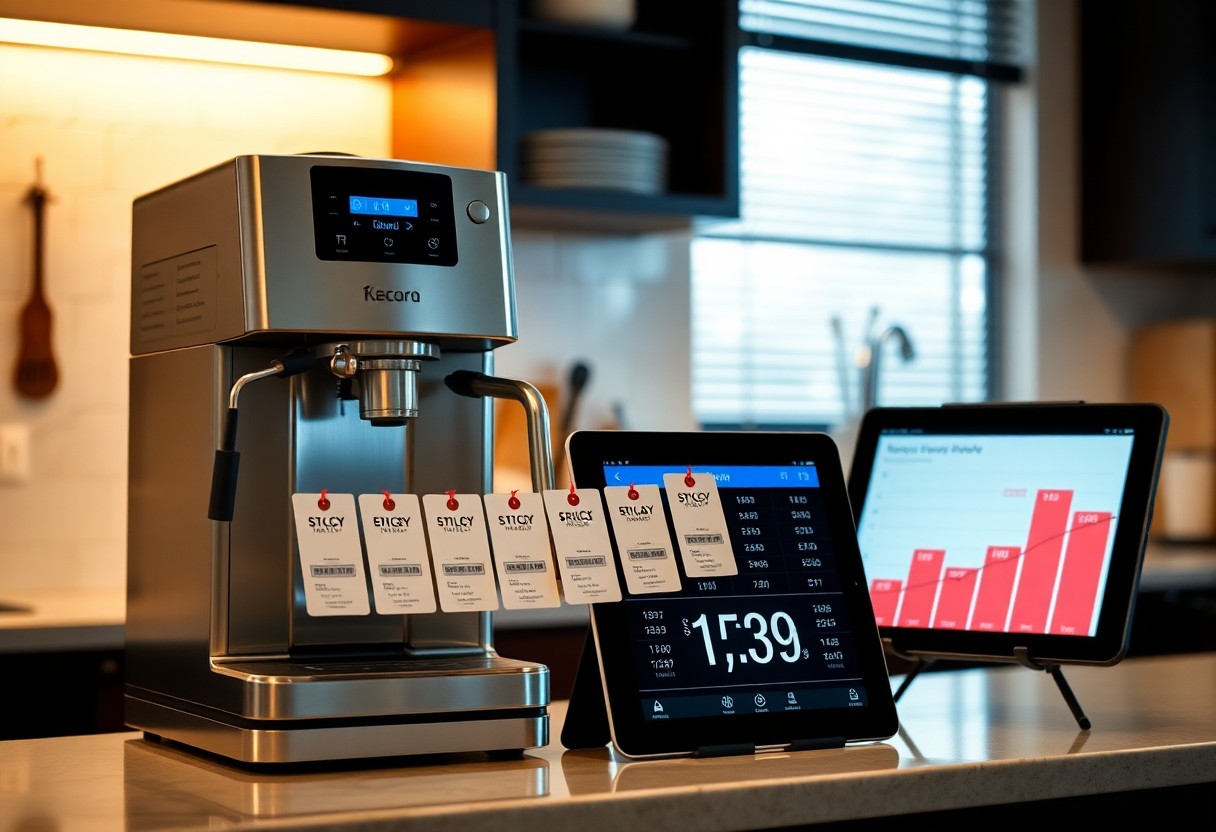
The Cost Spectrum: Entry-Level to High-End Machines
The cost spectrum for coffee machines ranges significantly, from basic models priced around $20 to high-end machines exceeding $500. Entry-level machines often include simple drip coffee makers or single-serve brewers that adequately meet your basic morning coffee needs. In contrast, high-end options, such as commercial espresso machines, offer advanced features and greater coffee brewing capabilities for serious enthusiasts. For a detailed look at the commercial side of things, check out How Much Do Commercial Espresso Machines Cost.
Features & Functions That Drive Price
Price variations in coffee machines are driven primarily by features and functions. Higher-priced models often come with programmable settings, built-in grinders, milk frothers, and customizable brewing options, allowing for a tailored coffee experience. In particular, espresso machines that offer pressure control and advanced timing functions will elevate both the flavor and quality of your coffee.
The Budget-Friendly Machines: Performance vs. Cost
Budget-friendly machines can deliver surprisingly good performance, offering vital features without breaking the bank. While lower-priced models might lack the bells and whistles of premium machines, they still brew excellent coffee with consistency. Smart shopping can lead you to machines that balance cost and quality, such as reliable drip coffee makers or compact espresso machines providing good value for your daily brew.
Choosing a budget-friendly machine doesn’t mean sacrificing quality. Look for reputable brands and models that have strong reviews, as these often give you the best bang for your buck. For instance, a reliable drip coffee maker around $50 might come with a glass carafe and a programmable timer, ensuring your morning routine is seamless without the need for excessive spending. By prioritizing vital features over luxury options, you can enjoy flavorful coffee without stretching your wallet.
The Role of Brand Prestige in Coffee Machine Pricing
Brand prestige significantly influences the pricing of coffee machines. Renowned brands often charge a premium due to their established reputation for quality and performance. High-end brands like Breville or Jura are associated with superior innovation and craftsmanship, leading you to perceive their products as more desirable and reliable, even if similar features are available at lower prices from lesser-known brands.
The Impact of Brand Name on Consumer Perception
Your perception of a coffee machine is often shaped by its brand name. Well-known brands evoke feelings of trust and satisfaction based on positive past experiences or excellent reviews. This psychological association can drive you to spend more, believing that a reputable brand guarantees a better brew and increased durability.
Are You Paying for the Name? Analyzing Value vs. Cost
The debate of value versus cost is particularly relevant in coffee machine purchases. While a higher price often reflects advanced features, outstanding customer service, and durable materials, you must weigh these benefits against your actual needs. Sometimes, lesser-known brands can provide comparable quality at a fraction of the price.
Analyzing value versus cost requires you to assess the functional benefits of the coffee machine against the brand-name premium. For instance, a machine from a premium brand with similar brewing capabilities as a budget-friendly option may not justify the increased cost. Additionally, when considering warranty terms, maintenance availability, and resale value, you might discover that paying less for a less prestigious brand can still meet your coffee needs and save you money long-term. It’s important to evaluate whether the prestige of a brand enhances your coffee experience or if you’re merely paying for a name that holds little value in your usage context.
Hidden Costs of Ownership: What You Need to Know
Owning a coffee machine involves costs that extend well beyond the initial purchase price. While you may have budgeted for the machine itself, hidden costs can accumulate quickly, including maintenance, repair expenses, and the price of necessary accessories and consumables. Awareness of these additional financial commitments can help you more accurately assess the overall investment in your coffee experience.
Maintenance and Repair Expenses
Regular maintenance and occasional repairs are inevitable for coffee machines, especially if you own an advanced model. Budgeting around $100 to $300 annually for cleaning supplies, descaling agents, and potential repairs helps ensure your machine operates efficiently and lasts longer. Neglecting maintenance can lead to costly repairs or reduced machine performance over time.
The Price of Accessories and Consumables
Accessories and consumables contribute significantly to your overall coffee machine expense. Items such as filters, pods, and specialty ingredients can accumulate over time. Monthly expenses for quality coffee beans and maintenance items could range from $30 to $100 or more, depending on your brewing preferences and habits.
When considering the price of accessories and consumables, think about the quality of products you desire. For espresso machines, premium coffee beans and fresh milk can enhance your experience but may also increase costs. For instance, specialty coffee pods can set you back by $0.70 to $1 per serving, while high-quality beans typically range from $15 to $30 per pound. Balancing your coffee consumption with your budget is imperative to avoid unexpected spikes in your total cost of ownership.
Consumer Trends Influencing Coffee Machine Prices
Consumer preferences are rapidly evolving, and these trends greatly affect coffee machine pricing. As customers increasingly prioritize convenience and quality, manufacturers respond by introducing innovative features and technology. From eco-friendly materials to smart connectivity, these advancements can raise production costs, leading to higher retail prices. Staying informed about these trends will help you choose a coffee machine that meets your needs and budget.
Sustainability and Eco-Friendly Options
A growing number of consumers are seeking sustainability in their purchases, pushing coffee machine manufacturers to offer eco-friendly designs. Machines that utilize recycled materials or operate on energy-efficient principles are becoming more prominent, often justifying a higher price point. This trend resonates well with environmentally conscious buyers, who may prioritize these features over lower costs.
The Rise of Smart Coffee Machines and Their Price Tag
Smart coffee machines are gaining popularity among tech-savvy consumers, integrating features like app connectivity and programmable settings. Prices for these models can range significantly; for instance, basic smart machines may start around $200, while highly sophisticated versions might exceed $1,000. The allure of personalization and remote brewing options means you’re likely to invest more in these advanced machines.
As technology continues to evolve, expect smart coffee machines to include even more features, such as automated brewing schedules, customized beverage settings, and even voice command capabilities. The integration of these high-tech elements can lead to a steep price jump, often making them appealing yet costly choices for the discerning coffee lover. Investing in one of these machines may save you time and enhance your coffee experience, making it a worthy expenditure in the long run.
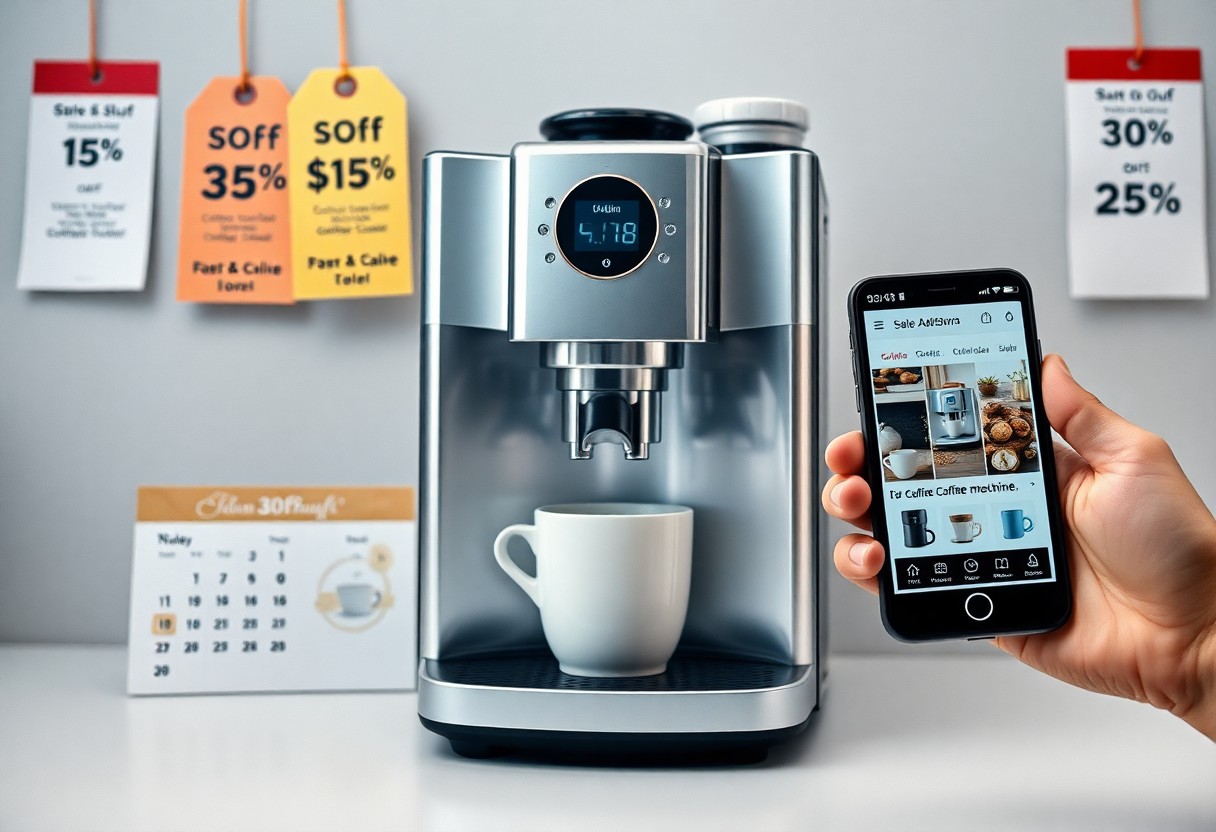
Navigating Discounts and Sales: Timing Your Purchase
Timing your purchase can significantly impact the price you pay for a coffee machine. Sales events, especially around holidays, are prime opportunities for snagging deals. Staying informed about upcoming discounts can help you find a quality coffee machine at a fraction of the cost. Consider setting price alerts on your desired models to track fluctuations and be prepared to act as soon as the price drops.
Seasonal Sales and Promotions to Watch For
Seasonal sales, such as Black Friday, Cyber Monday, and post-holiday clearances, often feature considerable discounts on coffee machines. Retailers tend to mark down models to clear inventory, making it an opportune time for you to purchase. Additionally, don’t overlook summer sales, where retailers may be eager to turn over stock before new releases.
Bundling Offers: Are They Worth It?
Bundling offers can appear attractive, combining a coffee machine with accessories or coffee pods for a set price. However, whether these bundles are worth it depends on your individual needs and the value of the included items. Before jumping in, assess the cost of each item separately to see if you’re genuinely saving.
Some bundling deals can lead to savings, especially if you already plan to purchase the additional items included in the offer. For instance, a $200 coffee machine bundled with $50 worth of coffee pods and accessories might save you $30 compared to buying everything separately. However, if you’re hesitant about the extra items or they don’t match your preferences, it’s wise to stick with just the machine. Analyzing the total value versus your brewing habits and needs could ultimately determine if such bundles serve you well or simply inflate your overall costs.
Summing up
Upon reflecting, understanding the price of a coffee machine requires you to consider various factors, including type, brand, and features. Entry-level machines can start at a modest price, while high-end models can reach several thousand dollars. By assessing your budget alongside your coffee preferences, you can make an informed decision that aligns with your needs. Investing in the right coffee machine will not only enhance your daily routine but also save you money in the long run compared to frequent coffee shop visits.
Q: What factors influence the price of a coffee machine?
A: The price of a coffee machine is influenced by several factors such as the type of machine (drip, espresso, single-serve, etc.), brand reputation, material quality, features (like grinders, milk frothers, and programmability), and capacity. Additionally, advanced technologies like smart connectivity or built-in maintenance features can also increase costs.
Q: What is the average price range for different types of coffee machines?
A: The average price ranges can vary widely based on the type of coffee machine. For instance, a basic drip coffee maker typically costs between $20 to $100, while mid-range espresso machines can range from $100 to $500. High-end models and commercial machines can exceed $1,000, especially those that offer specialized brewing options.
Q: Are more expensive coffee machines worth the investment?
A: Whether an expensive coffee machine is worth the investment depends on individual preferences and usage. Higher-priced machines often come with better build quality, more features, and improved brewing capabilities. For regular coffee drinkers or those who enjoy specialty coffee, investing in a more premium machine can enhance the overall experience.
Q: How can I save money when purchasing a coffee machine?
A: To save money when purchasing a coffee machine, consider buying during sales events or holidays, looking for refurbished models, or selecting machines without many additional features. Researching and comparing different brands and models can also help make a more cost-effective decision.
Q: What are the long-term costs associated with owning a coffee machine?
A: Long-term costs associated with owning a coffee machine include the price of coffee beans or pods, maintenance (such as descaling and cleaning supplies), and potential repairs. Depending on the machine type, energy consumption can also be a factor. It’s vital to factor in these ongoing costs when considering the overall investment in a coffee machine.

